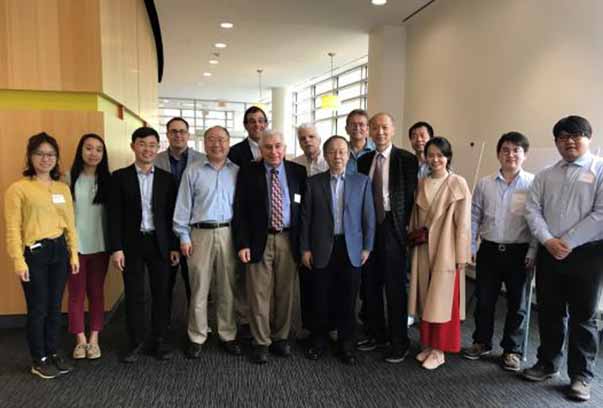Related News for Ming Su
2024 URF Scholars Recipients
Several engineering students received 2024 URF Scholars Awards from Northeastern’s Office of Undergraduate Research and Fellowships. URF Scholars are students who are graduating this year and who have earned a PEAK Experiences Award, applied for a distinguished fellowship, or participated in graduate school advising.

Northeastern Among Top 100 Universities for Utility Patents
Northeastern University, recognized for its excellence in innovation and entrepreneurship, has once again been named one of the top 100 universities worldwide for securing utility patents by the National Academy of Inventors.

Patent for Developing a Microwell Array for Improved Cystic Fibrosis Treatment
ChE Professor Ming Su and Assistant Research Professor Sidi Bencherif were awarded a patent for “Coordinately-ordered single cells with individual identities for high-throughput assay.”

Creating Radiation Shielding with Nanoparticle Composites
ChE Professor Ming Su was awarded a patent for “Enhanced radiation shielding with conformal, lightweight nanoparticle-polymer composite.”

Effectiveness of Common Fabrics Against COVID
ChE Associate Professor Steve Lustig and Professor Ming Su’s research on “Effectiveness of Common Fabrics to Block Aqueous Aerosols of Virus-like Nanoparticles” was published in the American Chemical Society journal.

First International Conference on Biomaterials and Chemical Biology
Professors Ming Su and Art Coury of the Department of Chemical Engineering hosted at Northeastern University the first International Conference on Biomaterials and Chemical Biology. Collaborative research in these disciplines […]

Su's Article Selected as Cover for Analyst
ChE Associate Professor Ming Su’s article on “Three-dimensional microtissues as an in vitro model for personalized radiation therapy” was selected to be featured on the cover of the Analyst journal.
Laser induced soil decontamination highlighted by AIP & UPI
ChE Associate Professor Ming Su’s research on “Laser induced rapid decontamination of aromatic compound from porous soil simulant” was published in the Journal of Applied Physics.
Su Awarded $300K Grant from Department of Justice
ChE Associate Professor Ming Su received a $300K grant from National Institute of Justice to work on new nanoparticle barcodes which would have astronomically large coding space, comparable to those of printed barcodes, but completely invisible to naked eyes.
Su Presents Research at ISSRPRT 2017
ChE Associate Professor Ming Su was invited to present his research on "Single cell based DNA damage assay for space radiation research" at the 5th International Symposium on Space Radiation and Particle Radiotherapy (ISRPRT 2017).
Su Featured in DOD Lung Cancer Research Annual Report
ChE Associate Professor Ming Su's research on cancer biomarker detection using phase change nanoparticles was highlighted in the recent annual report of Lung Cancer Research Program of Congressionally Directed Medical Research Program of Department of Defense.
Su Awarded NSF Grant for Enhanced Adsorption Cooling
ChE Associate Professor Ming Su was awarded an $160K NSF grant for "Enhanced Adsorption Cooling with Monolithic Nanoporous Adsorbents".

Professor and Chair Thomas Webster and Professor Ming Su Featured as Opinion Leaders in International Journal of Nanomedicine Videos
ChE Professor & Chair Thomas Webster and Associate Professor Ming Su are featured in videos highlighting "Biomedical perspectives of novel biomaterials" by Nanomedicine.

Chemical Engineering Celebrates New Collaboration with Wenzhou Institute of Biomaterials and the Longwan District (Wenzhou, China)
On April 5, delegates from the Wenzhou Institute of Biomaterials and Engineering and City Officials from the Longwan District traveled from Wenzhou, China to Northeastern for a special campus visit and welcoming ceremony.
Su & Webster receives Zhejiang Award from China
ChE Professors Ming Su and Thomas J. Webster each received the Zheijang Award from China to support international research collaborations between the ChE and the Wenzhou Institute of Biomaterials and Engineering (WIBE).